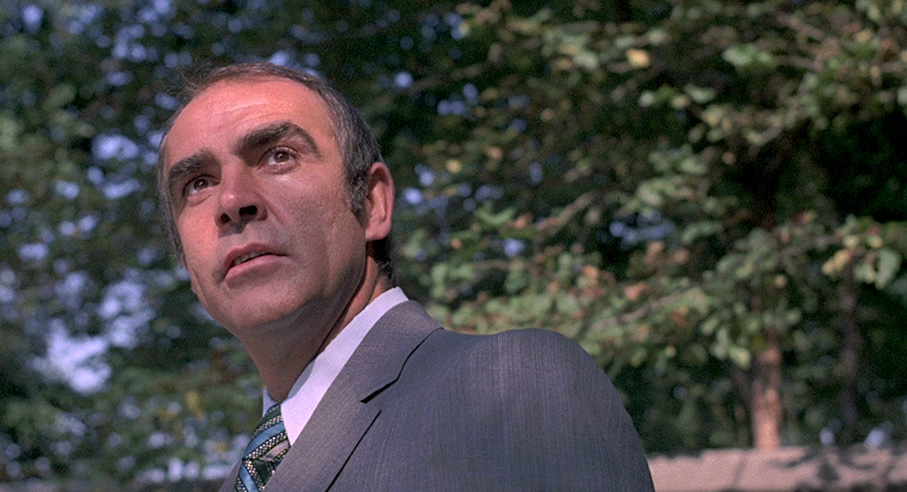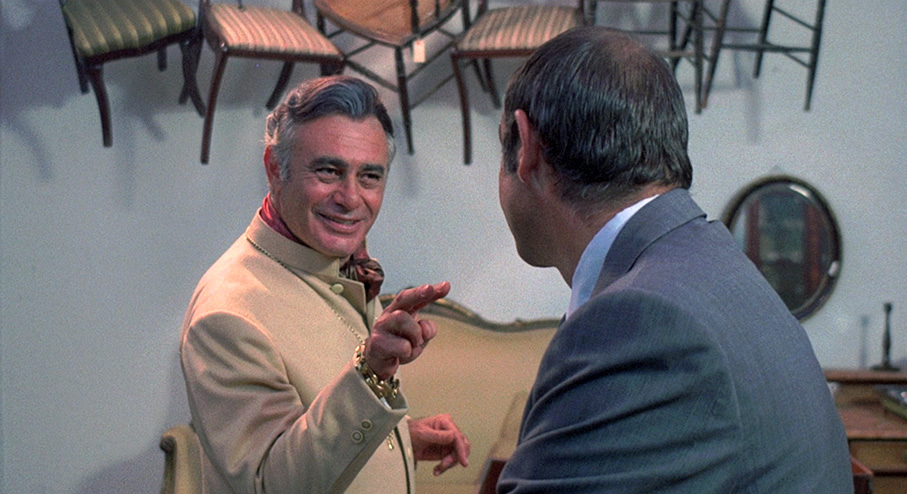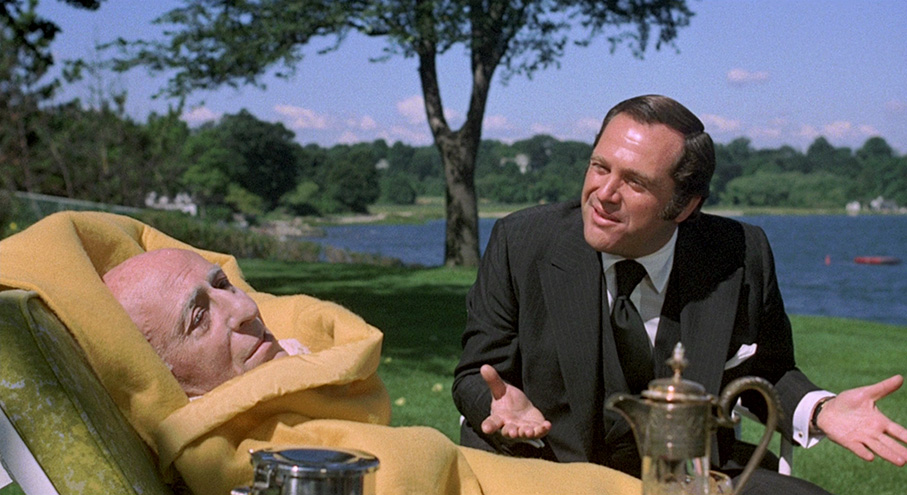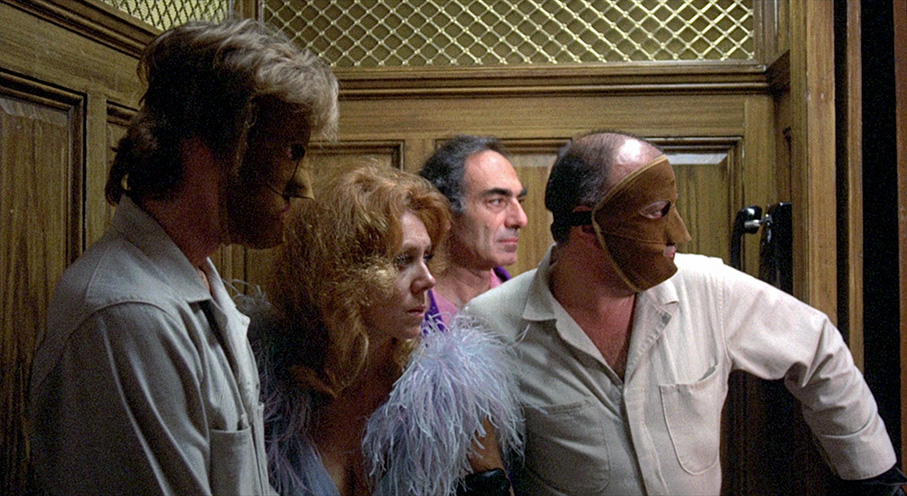|
Odd though this may sound but it is perfectly possible for a film to be simultaneously forward-looking and awkwardly stuck in time. Take The Anderson Tapes, a 1971 crime thriller from director Sidney Lumet that predicts the pervasive nature of our modern surveillance culture but whose characters refer to homosexuals contemptuously as 'fags', and a gay principal character camps it up like Christopher Biggins on the pull at a sex resort. Then again, the mere fact that a film made in 1971 has a sympathetic gay character, one whose effete manner is put to effective use in the execution of a bold if unlikely criminal enterprise and who is accepted without prejudice by his more macho colleagues, should perhaps be seen as progressive for its day. And the too-easy and contemptuous use of terms like "fag" and "sexual deviant" (yep, that one's here too) is an accurate if uncomfortable reflection of attitudes of the time. This is 1971 New York City, and the second of director Sidney Lumet's five collaborations with leading man Sean Connery. I'm guessing that few, if any, would claim it was their best, but this is still an intriguing work, as much for its predictive subtext as its offbeat caper story.
Connery plays the titular John "Duke" Anderson, a professional safecracker who is has just completed a 10-year stretch in prison. Shortly after his release, he calls in a debt of honour from Angelo (Alan King), a rising mob star with whom he has a history, to finance an audacious but potentially lucrative job in which he plans to rob all of the apartments in the upmarket building in which his girlfriend Ingrid (Dyan Cannon) now lives, and to do it in a single, military-like operation. To aid him in his task he assembles a small crew consisting of a young lock and alarm expert known only as The Kid (played by fresh-faced newcomer Christopher Walken), art and valuables expert Tommy Haskins (Martin Balsam), driver Spencer (Dick Anthony Williams), freelancer Jimmy (Paul Benjamin), and the ageing Pop (Stan Gottlieb), an alcoholic whom Anderson befriended in jail and who is having trouble adjusting to civilian life. Whilst eventually willing to fund the job, Angelo makes it a condition that the gang take bigoted hard man Socks (Val Avery) with them and ensure that he dies during the course of the robbery.

The Anderson Tapes is a crime caper movie that wears its surveillance subtext like a brightly-coloured bonnet, introducing it in the opening shot in the shape of a group therapy recording of Anderson enthusiastically comparing the experience of forcing his way into a safe to a sexual conquest. Did I mention that some elements of the film have not dated as comfortably as others? Almost everywhere Anderson goes from this point on, he is recorded or filmed or photographed, often unknowingly. As a result, almost every aspect of his preparation for the job is captured on film, video or audio tape, which in theory should give the authorities all they need to anticipate his actions and foil his operation. But here's the thing – none of those carrying out the various surveillance operations is targeting him, and working independently of each other they are thus catching only snippets of what is being planned, snippets that have little bearing on what they have been charged to investigate. Thus, when he first meets with Spencer, Anderson is only being watched because a surveillance team is monitoring the Black Panther office above which Spencer's place is located, while the bug in Ingrid's apartment turns out to have more to do with personal jealousies than any official investigation. Elsewhere the recordings are even more dispassionate; security cameras in buildings and elevators or photos taken for official documentation, puzzle pieces that nobody can recognise as such. What surprises about all this from a modern perspective, where seemingly every public space is monitored by CCTV or private security cameras and our every move online is being logged, is just how long some of us have been aware of being watched wherever we go, our actions and words recorded by unseen agents with the authority to use such information against us in ways we still cannot predict.
Intriguing though this definitely is, The Anderson Tapes still has to stand or fall by its credentials as a crime caper movie, and while it's definitely not up there with the cream of the genre, this still makes for engaging entertainment, particularly once the job itself gets under way. Occupying the final 40 minutes of a 99-minute film, the robbery unfolds as a series of sparky conflicts with the various occupants of the targeted apartments. These range from the man who puts a higher value on the contents of his safe than his wife's wellbeing to the fiercely resistant woman who turns out to be protecting her handicapped son, a boy who is fascinated by the work of the intruders and who in turn becomes a principal source of disruption. It's also here that Lumet takes a bit of a structural gamble, breaking the narrative linearity by repeatedly flashing forward a post-robbery sequence in which the victims are interviewed by the press and police about their experiences. As a technique this proves surprisingly effective, spicing up what usually plays out in a rigidly linear manner without disrupting its flow, at the same time subtly misdirecting the audience over how events will likely play out.

Having already proved his considerable worth as a non-Bond leading man in Lumet's The Hill, Connery is once again on fine form as Anderson, confident of his skills and radiating the sort of authority required to lead such a venture and keep a violent mafia goon like Socks in line. In a strong supporting cast – each one of the robbery victims is colourfully defined and interesting in their own right – Alan King shines as Anderson's cheery mob contact Angelo, and while the stereotypical camp of Martin Balsam's performance as Tommy Haskins has really dated, he still convincingly sells the notion he would be instantly accepted by the well-to-do residents of the apartment block as an upmarket interior decorator, a guise he employs to cheerfully case their apartments and identify anything worth stealing. The film also has a couple of pleasant character surprises, notably the alcoholic Pops, who's set up from the start as a pity-case inclusion who will screw up at a crucial moment, but who unexpectedly comes through at every turn.
I'll freely admit that the caper itself is neither as ingenious nor as gripping as those you'll find in some of the genre's more widely celebrated high-fliers, despite the tension that builds when uncooperative residents cause the robbery to stutter and some real creativity in aspects of the planning – the manner in which three of the gang bamboozle the apartment block doorman by arriving in quick succession in different guises is particularly neat. Gender politics are not the only thing that have dated here – I'm sure the early electronic whines, pings and oscillations of Quincy Jones's score used to accompany shots of recording devices seemed rad in their day, but they set my teeth on edge and had me scrabbling madly for the volume control. But the storytelling is brisk with next to no wasted moments, Lumet's eye for casting and character enlivens even the briefest interactions, and the integration of the surveillance subtext is consistently intriguing and provides the film with an ending about which I could write a sizeable paragraph. The Anderson Tapes may not be one of Lumet's most notable achievements (but then look at the competition), but it's still a film that finds him in uncharacteristically playful mood, and unlike many of the titles for which he is rightly celebrated, it's also rather fun.
The Anderson Tapes is a film that, like a good many studio works of the time, was shot and lit very much with visual clarity in mind, with faces rarely falling into shadow and even windowless interiors often bathed in light. I've little doubt that this is a key reason that the 1.85:1 1080p transfer on the Blu-ray in this dual format set is so consistently excellent, particularly in its attractive colour palette that's vibrant when it needs to be and the spot-on contrast balance, which nails the black levels without sucking in any of the surrounding details and never softens on the rare occasions where the light levels drop. The sharpness and detail are also strikingly crisp – on a couple of close-ups of Connery's face you can see almost every pockmark and hair. As you'd expect, the image is clean and free of damage, and a subtle film grain is visible.

The linear PCM 1.0 mono soundtrack is in fine shape, clear enough indeed to make those electronic notes of the score really tear into your eardrums. Crucially, the dialogue and sound effects are always cleanly captured, and there are no traces of damage or wear in the quieter scenes.
Optional English subtitles for the deaf and hearing impaired have also been included.
Audio Commentary by Glenn Kenny
Critic and film writer Glenn Kenny delivers an information-packed commentary on all aspects of the film, from the director, the actors and the cinematographer to the source novel, the locations and even the typeface used for the opening credits, which Kenny identifies as Data 70 (it's actually not, but a variant of it – sorry, but finding and identifying fonts is one of the more tedious aspects of my day job). He has a similar reaction to the more annoying parts of the score as I did, reads from Lumet's own writing about his process of working with actors, and has an entertaining anecdote about the need to keep the negative out of New York mob hands. There's plenty more, all of it worthwhile – he even offers a prize to anyone who can identify one of the extras.
Super 8 Version (16:06)
If this particular precursor to home video is new to you, then you'll find a more detailed outline in my review of Indicator's disc of The New Centurions, which I see no good reason to repeat here. The compression of the film into just 16 busy minutes makes nonsense of the surveillance subtext, and the whole thing scurries on to the robbery in less than four minutes and then rips the guts out of that as well. As with the one for The New Centurions, this plays in part like an overlong trailer, albeit one that includes a sizeable chunk of the finale. Actually, most modern trailers seem to do that anyway. As you would expect, the image is cropped to 1.33:1 and is of a quality that will make fans of pristine restorations shudder. Impressively, this also has optional English subtitles.

Theatrical Trailer (3:02)
A trailer that captures the essence of the film, but not without dancing dangerously with spoilers.
Gallery
56 manually advanced slides of production photos (some of which are really good), front-of-house stills, posters and promotional artwork.
Booklet
This well-produced booklet kicks off with a thoughtful essay on the film by critic Thirza Wakefield, which is followed by a contemporary review by Richard Combs from Monthly Film Bulletin, an anecdote about the production from Sidney Lumet's memoir Making Movies (which is also related in the commentary), and an extract from Lawrence Sanders' source novel, which is constructed from transcripts of the surveillance recordings. Credits for the film and production stills have also been included.
Over the course of his career, Sidney Lumet made an almost disproportionate number of genuinely great films, and while The Anderson Tapes is not up there with the best of them, it's still a fascinating and enjoyable work whose stuck-in-time elements do not seriously detract from its more forward-looking aspects and the workmanlike professionalism of its execution. The transfer on the Blu-ray of Indicator's dual format release is terrific, the commentary first-class, the booklet of the usual high standard, and you even get the decimated Super 8 version of the film. An easy one to recommend, particularly for fans of the director or his leading man.
|